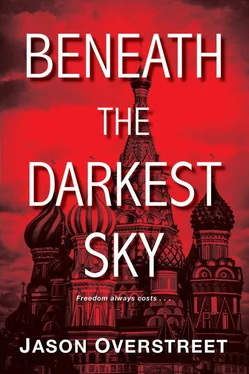At the entryway of the camp was a large sign above that read: WORK IN THE USSR IS A MATTER OF HONOR AND GLORY. Of course, I saw it much differently. The sign was missing two key words. “Forced” at the beginning and “not” after “is.”
Based on what I’d seen upon arrival when they opened the hatch and brought in the lamps, I was guessing that at least a hundred had died in the hold. There were only nine hundred of us now. We marched through the dark clouds that had fallen, the seasickness still in our legs. We passed by columns of shabby barracks. I wondered if zeks were asleep inside or if the buildings were empty. Whatever the case, it looked like a snowy ghost town on the moon.
Walking behind us in the distance toward a different area of the camp were the women from our ship, maybe a few hundred of them, some holding babies. The old man had said there were nurseries and maternity wards in the camps. Stalin hadn’t missed a thing.
Continuing to discreetly gaze back at them, I couldn’t help but try to find a couple of black faces, but it was pointless. My wife and daughter had gone north from Moscow.
As we walked deeper inside, there were guards with big-eared, pointy-faced, mangy-looking, vicious dogs on chains patrolling everywhere. We passed by one wooden structure after another, all of them properly built actually with solid foundations and sturdy beams. A food barracks on the left that smelled of cabbage had a poster on the front door with an image of a hand clutching a snake near the head. At the bottom it read: WE WILL ERADICATE SPIES AND DIVERSIONISTS, AGENTS OF THE TROTSKYITE—BUKHARINITE FASCISTS!
With smoky fog feeling like it was coming up from the ground, we approached a nicer-looking structure where the NKVD might be stationed. Or perhaps this was also the Dalstroi headquarters, because it looked official, the red and yellow state flag blowing high above. An officer stood in front in the distance and held a megaphone.
“Davai! Davai!” he said. “Bystrey! Bystrey!”
We sped up, but he kept repeating those same words in his violent Russian. “Get going! Get going! Faster! Faster!”
With our accompanying guards repeating his command, we began to run until we arrived at the stone building, which was painted white. “Catch up, you lazy zek !” the commander said through the megaphone. I turned and, through the fog, could barely see a prisoner laboring behind in the distance. He was limping but trying like hell to join the rest of us.
“Ubey yego!” said the commander, looking up at one of the watchtowers and nodding.
An NKVD man stationed up high pointed his rifle downward and fired two shots at the zek , dropping him to the permafrost. He lay there facedown. Dead.
“Welcome to Magadan, zeks !” the commander said through the black megaphone, as if nothing had happened. “I am Commander Drugov. You are part of the new system. We may be several time zones away from Moscow, but the Central Committee has spoken to us. They have been coddling the zeks for years here in the Sevvostlag system. But our great Stalin has replaced all of the Sevvostlag commanders with new, more knowledgeable ones. There will be no more wasting time and money.”
I gazed to my left at James and was hoping he’d grown accustomed to hearing lectures that sounded far too intellectual for him. He knew I’d explain things later.
“The Central Committee has voted to make Kolyma more productive,” he continued. “The mines and roads are not being worked hard enough. The loggers are not sufficiently cutting the trees down in the taiga. The women are not harvesting peat beside the river fast enough, or washing clothes, cooking, cleaning, and sewing rapidly enough. They are being scolded for such things over in their camp.”
He pointed to the right in the distance.
“But that will all change now,” he continued. “You will get your daily ration, but it will consist of hand-sized black bread for the day, hot soup in the morning, gruel for lunch, and hot water for dinner. You are henceforth to be known as Lagpunkt Seventy-Nine. Your ship was supposed to only be for hauling ammonium nitrate, but they managed to squeeze your little unit in.”
He put the megaphone down and was handed a sheet of paper from a guard. I was still thinking about being several time zones away from Moscow. It seemed we were closer to Alaska.
“Kolyma is called ‘the island,’” he continued. “Not because it’s an actual island, but because it is all alone away from the mainland. Once you are out there some three hundred miles minimum from here, we won’t try to stop you from escaping. Just know that no one has ever made it out. Never! Understand?”
“DA!” we yelled.
“Fortunately for you, however, for the time being, you are being assigned to build more barracks here in Magadan, structures that will further serve our ever-growing Dalstroi headquarters. Nice offices for our great Stalin to sit in whenever he visits! Yes?”
“DA!” we screamed.
“Your thirty-day slog through the ice and snow won’t begin just yet. As you can see, this holding camp is very large. There are many thousands here, all with their own schedules for departure. But within the camp, there are a few cordoned-off sections for smaller communities to live as separate lagpunkts and remain here indefinitely. Magadan itself needs a myriad of jobs done for its own community. Yours will be to shut your fucking mouths and hammer nails while most of the zeks come from the ships and head straight to the mines. Yes?”
“DA!” we shouted.
“Stand in line and wait for the guards to check you in, zeks . Oh, and one more item. If you decide to break into the women’s camp and rape a female zek , you will be shot in your mouth straight away. Stay in your lines now!”
James and I waited and waited until finally a short officer with a clipboard approached. “Give me your papers!” he said, his Russian rather high-pitched, his breath, rotten.
“Prescott Sweet!” he said, searching his list, flipping pages, his short, little finger running over the names. He’d actually pronounced my name, “Sveet,” like every other Russian, as the w sound didn’t exist in the Russian language, but I always immediately translated it to the proper “Sweet” as my ear took it in.
“You are now number 22-AA,” he continued. “Don’t forget! Now… what was your profession?”
“Engineer,” I said.
He looked at me sternly. “Go line up at building nineteen. It is there!” He pointed south. “Past the top commander’s office.”
“This is my son.”
“Shut up, zek ! Shut up now! He can stay here in line. Go to nineteen!”
I reluctantly left James behind, but it had given me encouragement to see him nod for me to go. It was like he was becoming a burgeoning young man, almost fifteen. He was more confident in himself, and I hadn’t noticed until now how tall he was getting, maybe five-eleven.
There were about ten men lined up when I arrived at nineteen. When we were finally let inside, I made note of how much warmer it was, as this was one of the meeting barracks for the officers, equipped with rows of wooden benches and a podium up front.
“Come and sit,” said the commander, walking up to the lectern. “So many things will be changing in the coming years in Magadan. The state has not even given it town status yet, but that will likely happen next year. Meanwhile, you have all claimed to have been professional engineers.”
He surveyed the ten of us and half smiled. I was glad to be in the company of a man who enunciated his Russian words with calm precision. He was intellectual sounding, his green uniform well kept, and his Nordic-looking face clean-shaven.
Читать дальше











